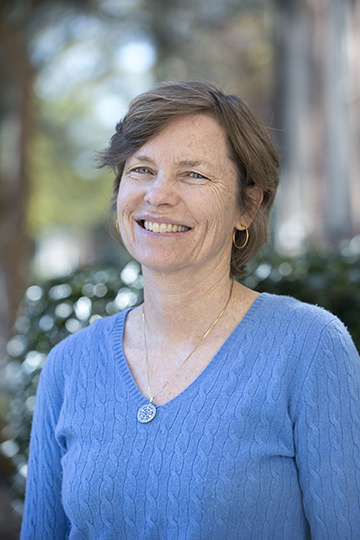
Elizabeth “Betsy” Dobbins has taught biology at Samford University since 1996. Over the years, she has seen a growing concern on the part of students for water quality. She believes students have become more aware of the potential impacts of climate change, which will be critical in how people manage water resources in the future.
“The Southeast has more of its rainfall now concentrated in larger storm events, which will mean more erosion and flooding,” she said. “This means that construction site management and low-impact development will be more important in the future.”
Dobbins said students are receptive to and interested in these ideas. “They really do want to be a part of a solution.”
Dobbins, who this week was named a member of the inaugural All-Southern Conference Faculty Team, has helped students become involved in solutions through her teaching and by leading hands-on cleanup efforts in local creeks.
“The small creeks that form headwaters for rivers are the most biologically rich and the most vulnerable,” she said. “All creeks near urban and suburban areas are currently impacted. Municipalities that maintain a wide forest buffer along rivers protect them best.”
Awareness of the importance of good water quality has helped improve some urban creeks, and there has been an increase in citizen participation and in clean-up efforts, Dobbins said. Last fall, more than 140 Samford, UAB, Birmingham-Southern and Homewood High School students helped clean trash out of Shades Creek, which runs adjacent to the Samford campus.
In November, Dobbins and Samford students joined volunteers from the Homewood Environmental Commission and Birmingham Botanical Gardens to plant 250 trees along Shades Creek.
“Alabama is a beautiful state with incredible aquatic life,” said Dobbins. “Bottom-dwelling macroinvertebrates — including worms, clams, mussels and the larval stage of flying insects like dragonflies — form the basis of aquatic communities.”
Dobbins noted that macroinvertebrates signal the health of creeks and rivers. Some (such as midges and worms) can survive polluted water, and others (like mayflies, stoneflies and caddisflies) need clean water with plenty of dissolved oxygen.
“Trout and other game fish like specific, often pollution-sensitive, flies,” she said. “If the flies disappear, the fish do, too.”
She described Alabama as “water-rich but protection-poor” with streams and rivers in urban and suburban areas affected by industrial pollution, sediment, lawn chemicals and petroleum run-off from streets and parking lots, and rural areas being impacted by mining, agriculture and landfills. This is why Alabama leads the nation in the extinction of freshwater species, she said.
But she noted that since the institution of the Clean Water Act of 1972, “things have improved, particularly in urban areas.” And the fact that her students are interested in working for clean water inspires her “to want to learn more and to keep the waters clean for them and their children.”
The All-Southern Conference Faculty Team recognized a faculty member at each school with demonstrated service to the institution, a proven record of high achievement among students, as well as research and academic writing projects, and contributions to campus life and the local community.
Southern Conference Commissioner John Imarino will recognize Dobbins at the Feb. 1 Samford men’s basketball game.
